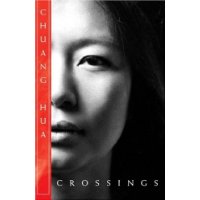| 商家名称 |
信用等级 |
购买信息 |
订购本书 |
|
|
 |
Crossings |
 |
|
 |
Crossings |
 |

基本信息·出版社:W. W. Norton & Co.
·页码:224 页
·出版日期:2007年06月
·ISBN:0811216683/9780811216685
·条形码:9780811216685
·装帧:平装
·丛书名:New Directions Paperbook
·外文书名:十字路口
内容简介 在线阅读本书
A powerful story of one woman's displacement between cultures and traditions—a landmark in Asian-American literature.When it was first published in America in 1968, Chuang Hua's evocative novel
Crossings was completely unheralded and quickly went out of print. Years later it would be widely recognized as the first modernist novel to address the Asian-American experience, its deeply imagistic prose—marked by spatial and temporal leaps, an unconventional syntax, and unanticipated shifts in plot—as haunting as the writing of Jane Bowles.
At the center of
Crossings is Fourth Jane, the fourth of seven children whose recollections of an oppressive yet loving father, Dyadya, are collaged with her constant migrations between four continents. Suffering from a domestic torpor occasionally enlivened by ritualistic preparations of food for her foreign lover, Jane's displacement only heightens the remembrance of what she has fled: a breech of the familial code; a failed romance; and further in the past, the desolation of war as "bloated corpses flowed in the current of the yellow river." Spare, lyrical, Taoist in form and elusiveness, visually cinematic, tender and sensual, Chuang Hua's powerful narrative endures as one of the most moving and original works of literature in the history of American letters.
作者简介 Chuang Hua (the Chinese name and pen name of Stella Yang Copley, 1931-2000) was born in Shanghai. During the Japanese invasion, she fled with her family to Hong Kong, eventually moving to England, and then to the United States, graduating from Vassar College in 1951. She lived a very private and reclusive life.
Crossings is her only known written work.
媒体推荐 书评
From Publishers Weekly Starred Review. Hua's classic modernist novel from 1968 threads together the births, deaths, marriages, break-ups and global relocations of an upper middle class Chinese-American family. The narrative focuses largely on the dreams and recollections of the middle daughter, Fourth Jane (birth order precedes one's name in familial address) as breaks with tradition undermine the family's cohesiveness. First-born son Fifth James, for one, flouts his father's orders and returns from the army with a non-Chinese bride in tow, while Jane moves to Paris despite her father's entreaties to stay. Hua, the penname of Stella Yang Copley (1931-2000), writes in a muscular, free, indirect style ("Dyadya sat in his study and composed a letter. Dear James we are going to the Far East...") that beautifully captures personal and cultural contradictions and conflicts. The strongest plot line tracks Jane's affair with a foreign journalist, but even this frequently dissolves into ambiguities and fragments. Work, here, is a balm for the disorientation Jane feels: on several occasions, Jane deals with insomnia by preparing elaborate meals for her lover, just as her mother later copes with grief by meticulously cleaning the house. This new edition of the reclusive writer's only known work will help bring Hua's novel the readership it deserves.
Copyright © Reed Business Information, a division of Reed Elsevier Inc. All rights reserved.
From 500 Great Books by Women; review by Erica Bauermeister There is no straightforward plot line in
Crossings: details, memories, images, parts of conversations, rituals of cooking, planting and cleaning float toward the reader like brightly colored confetti thrown to the sky. A reader can put the pieces together like a puzzle and learn the story of Fourth Jane Chuang Hua, devoted middle daughter in a traditional upper-class Chinese-American family, "not sure who I am on the outside of the old context and ... afraid I might not survive the new." Or you can allow
Crossings to come to you in images, through your senses. Listen as grandmother responds to her grandchildren's birthday salutations with "machine gun" - "the only word she could remember now in English the sounds pleased her." Feel the coldness of dying Dyada's feet as his daughter Fourth Jane places them near her heart. Get ready to eat crabs: "cracking and tearing shells apart, chewing, sucking ... Of a hundred different ways to eat crabs this is the best, stirs the heart and is the most basic." Watch Ngmah clean a room with four pieces of cheese cloth, from top to bottom, and come to know what it means for Fourth Jane to reject her brother's wife because she is a "barbarian." By the end, you realize that many things, novels included, cannot be contained in a straightforward and linear form.
-- For great reviews of books for girls, check out Let's Hear It for the Girls: 375 Great Books for Readers 2-14.
--This text refers to an out of print or unavailable edition of this title. Maxine Hong Kingston She played with style and language to tell the modernistic story of Chinese becoming Western. A fascinating read.
Amy Ling, from the afterword Chuang Hua's themes...are not limited to Chinese-Americans: rather, they are universal concerns.




